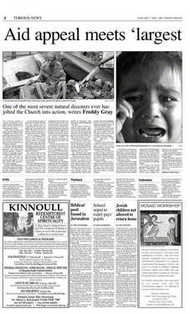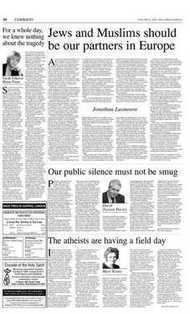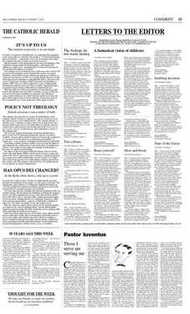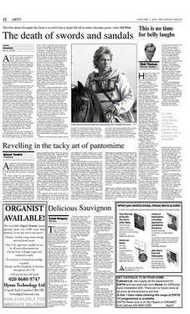Page 3, 7th January 2005
Page 3

Report an error
Noticed an error on this page?If you've noticed an error in this article please click here to report it.
Tags
Share
Related articles
Bishops Monitored Over Opus Dei Status
Hips, Wealth And Women
Papal Praise For Beseiged Opus Dei
Papal Visitation On Opus Dei
Opus Dei Reports Bbc To Ofcom Over Tv Drama
Opus Dei comes in from the cold – but its critics are suspicious
Although rumours con tinue to swirl around Opus Dei, relations between the organisation and the Vatican have never been better, writes Dan Frank.
A previous pope, Paul VI, was said to be suspicious of Opus Dei, fearing that its priests within the Vatican were leaking confidential documents and secrets to the group’s founder, Josemaria Escriva de Balaguer. And Mgr Escriva, aware of the Pope’s hostility towards his cause, reportedly warned of “the rotting, something evil, coming from within the Church and from high up”.
Pope John Paul II, on the other hand, though not a member, has taken a markedly different approach. He canonised Opus Dei’s founder in 2002, just 17 years after Mgr Escriva’s death, and in 1982 granted Opus Dei the status of personal prelature. Uniquely within the Church, its jurisdiction relates to its members, rather than to a particular geographical region. Although members are also subject to the diocesan hierarchy, the movement as a whole is not.
Around the same time as it received this sign of papal favour, Opus Dei allegedly supplied about £100 million to cover the debt owed to the Vatican by Roberto Calvi, “God’s Banker”, who was later found hanging under Blackfriars Bridge.
Mgr Vladimir Felzmann, a former Opus Dei priest, has claimed that, during his time as a confidant of Escriva, he helped him instal secret microphones to bug his visitors and heard him express admiration for Hitler.
Pope John Paul II and Opus Dei share similar doctrinal inter ests: both stress the cult of the Virgin Mary and the importance of tradition and orthodoxy. Opus Dei sees itself as very much in line with the Second Vatican Council’s emphasis on the role of the laity.
Like the early Jesuits, the group is marked by fidelity to the teachings of the Magisterium of the Church and insistence on the principle of papal primacy. Opus Dei’s strict orthodoxy is detested by liberal Catholics, yet it has also made enemies among traditionalists who believe it has defended popes who have gone too far in their disciplinary reforms and ecumenism.
Within the Vatican, Joaquin Navarro-Valls, the Pope’s press secretary, is a member and Cardinal Angelo Sodano, the Vatican Secretary of State, is known to be sympathetic. Relations between Opus Dei and the Church in England and Wales are considerably more frosty, but have greatly improved since 1981, when a suspicious Cardinal Basil Hume published recommendations for the organisation’s conduct within the Archdiocese of Westminster.
He suggested that under-18s should not be allowed to “take any vow or long-term commitment in association with Opus Dei”, that young people considering joining discuss the matter with their families, and that “care must be taken to respect the freedom of the individual”, including their right to join or leave without “undue pressure” and the right to choose their own spiritual director. Finally, he said that Opus Dei-sponsored activities should clearly identify themselves as such. Opus Dei gradually gained acceptance and, a year before his death in 1999, Cardinal Hume celebrated a Mass marking the 70th anniversary of its foundation. The organisation now runs two schools in Britain.
Opus Dei, literally “The Work of God”, was founded in 1928. It has an estimated 84,000 lay members across five continents. Around 48,500 of these live in Europe, 500 of them in Britain. Women make up a little over half the membership. The associated Priestly Society of the Holy Cross has 1,800 ordained members, including 15 bishops and two cardinals.
Opus Dei’s founding premise is that everyone is called to holiness: in some ways full members (numeraries) live a monastic life, though they make only a commitment and do not take holy orders. Numeraries, who make up around 20 per cent of the organisation, remain celibate and live in single-sex Opus Dei centres. They give up their salary to the organisation and receive a stipend.
Numeraries follow the “plan of life”, a daily routine that includes Mass, devotional reading, and private prayer. Male numeraries are encouraged to consider ordination in the priesthood.
Single men, including priests, are discouraged from spending time unchaperoned with single women – this applies even to car journeys.
Although even its critics admit that it has become less secretive, Opus Dei remains plagued by controversy. It remains to be seen whether the next pope will be as friendly towards the organisation as John Paul II.
blog comments powered by Disqus

















